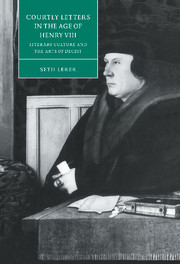Book contents
- Frontmatter
- Contents
- List of illustrations
- Acknowledgments
- Note on editions and abbreviations
- 1 Pretexts: Chaucer's Pandarus and the origins of courtly discourse
- 2 The King's Pandars: performing courtiership in the 1510s
- 3 The King's hand: body politics in the letters of Henry VIII
- 4 Private quotations, public memories: Troilus and Criseyde and the politics of the manuscript anthology
- 5 Wyatt, Chaucer, Tottel: the verse epistle and the subjects of the courtly lyric
- Notes
- Index
- Cambridge Studies in Renaissance Literature and Culture
1 - Pretexts: Chaucer's Pandarus and the origins of courtly discourse
Published online by Cambridge University Press: 17 November 2009
- Frontmatter
- Contents
- List of illustrations
- Acknowledgments
- Note on editions and abbreviations
- 1 Pretexts: Chaucer's Pandarus and the origins of courtly discourse
- 2 The King's Pandars: performing courtiership in the 1510s
- 3 The King's hand: body politics in the letters of Henry VIII
- 4 Private quotations, public memories: Troilus and Criseyde and the politics of the manuscript anthology
- 5 Wyatt, Chaucer, Tottel: the verse epistle and the subjects of the courtly lyric
- Notes
- Index
- Cambridge Studies in Renaissance Literature and Culture
Summary
Think of it as a book of lies. The courtly life had always been a show, and the literature of courtliness has always been appreciated for its arabesques of the deceitful. Years before Machiavelli and Castiglione had captured the courtier's ruses in maximal form, and decades before their work had been translated into English, Henry VIII's ambassadors and poets were displaying that rich blend of sycophancy and sincerity that would mark the sprezzaturas of the sixteenth century. In the first year of the young King's reign, Luiz Carroz, Ferdinand of Spain's ambassador to England, wrote that the experience of service forced him to dissimulate. By the end of Henry's first decade, poets such as Stephen Hawes and John Skelton could critically reflect on the cloakings and collusions of royal service. Thomas More lived among the “stage plays of the great,” and Erasmus recognized that the courtier must live behind the masks of theater. Such masking, as Erasmus and his peers well knew, involved not just the assumption of a voice but the transvestings of the body. The courtier becomes a creature of the corpus, whether it be as groom to a king, ministering to royal micturations, or as a performing self, garbed in the texts and textiles of the poet. The instabilities of courtly bodies extend to the very gender of courtiership itself. The courtier is both a pimp and prostitute: a panderer to the desires of the prince, a procurer of women, information, and advantage; but also a servant, whose needs have all the willful manipulations of the whore. As Erasmus put it, “Always be complaining and demanding, and just as skillful courtesans by various pretexts and devices always get something from their lovers, similarly let it be your endeavour always to get something from your prince."
- Type
- Chapter
- Information
- Courtly Letters in the Age of Henry VIIILiterary Culture and the Arts of Deceit, pp. 1 - 33Publisher: Cambridge University PressPrint publication year: 1997



